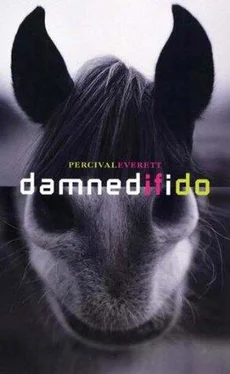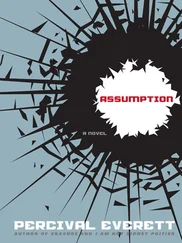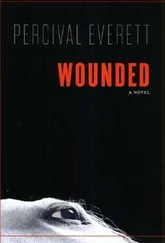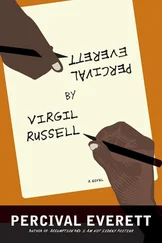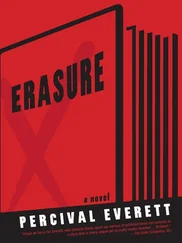Turing has put away his gear, hung his waders in the garage, and put his fly boxes on the shelf above his tying table. He sits at his desk, hands together, and waits for his wife to return from Louisville. It’s dusk when he hears her car.
Barbara walks past the door of the study, then comes back. “Alan?”
“Yes.”
“Why are you sitting here in the dark?” she wants to know.
“No reason, just sitting.”
“Are you okay? How was fishing?” Barbara puts her packages down by the doorway.
Turing switches on his desk lamp. The light bothers his eyes. “Fishing was decent, Barbara.”
“Catch anything?” She smiles, bends to pick up her things.
“Caught a few.” He looks at his desk. “How was Louisville?”
Barbara pauses. “It was fine, Alan.”
Later, at dinner, Alan pushes the takeout cartons of Chinese food away and looks at Barbara. “Do you believe that people create their own worlds?” he asks.
“What?” her mouth full.
“Nothing.”
“No,” she says, wiping her mouth. “Tell me what you’re talking about. What worlds?”
“What if, say, an animal, say a dog, talked to you, I mean, spoke a word?”
“Yes?”
“What would you think? Would you think you were crazy? Would you reassess your picture of the world?”
“Hell, no, I wouldn’t think I was crazy,” Barbara says. “I’d think I was rich. A talking dog, are you kidding? Do you know how much money I could make with a talking dog?” She laughs loudly, reaching for more food. “What’s on top of a house? Ruff,” she barks.
Turing looks out the window at the dark backyard.
“Did I hurt your feelings?” she asks.
“No.”
That night, in the darkness and cold of the room they have shared for twelve years, Barbara halfheartedly leads her husband into lovemaking. He moves with her or for her or because of her, pushing to breach the distance, pushing to make the distance, their orgasms mechanical, standard. Afterward, they lie awake, waiting, just waiting. The light through the window is from the streetlamp, somewhat blue, soft, and lost in the leafless tree limbs just outside.
Turing dreams. He is at a dinner party, across the room his wife is watching him while she talks to a woman in a blue dress and he knows she is talking about him. The food at the party is all the same color and comes by on trays carried by men with no faces. Turing moves through the party looking for someone whose face and name he cannot remember, like a song title, the person is lost in his head and he is becoming anxious. Music comes from somewhere, mechanical and standard, lost in the rhythm of shuffling feet as Turing notices the movement of people in circles, around and around, around the room and around points in space. Turing knows all the faces of the guests and even the faceless waiters. He gets no closer nor farther away from Barbara no matter which way he moves, no matter how fast he moves, and she is talking about him, now to a man in short pants. He takes more of the colorless food and searches for taste, some texture, anything. The emptiness wakes him with a start, his heart racing, his breathing short. He thinks about touching the hand of his wife, but doesn’t.
“A fish spoke to me,” he tells his wife the next morning, watching her tie her running shoes, a foot up on the stool in the kitchen.
“Very nice,” she says.
“No, really, a fish said a word to me.”
She looks at him.
“I’m not joking, Barbara.”
Barbara laughs.
“I’m scared. A fish — a big fish talked to me.”
“And what did this fish say?”
“He said ‘epigenesis.’ I saw its lips move. I heard it.”
“Epigenesis,” she repeats.
Turing nods.
“And you weren’t drinking?”
“No.”
“No drugs?”
“Barbara, I’m serious.” He pauses, leans back against the wall by the door. “Never mind.”
“Fine,” she says, looking at her watch, standing, looking out the window at the road, “I’ll be back in forty minutes.”
He watches her run out of the yard and down the street. She thought he was joking. He guesses that’s better than her believing him to be crazy.
The rain falls harder while Alan Turing sits behind the wheel, switching on the wipers to slap away at the spitting sky, pulling away from the gravel and mud. Turing struggles with remembering his name, recalling lessons from grade school instead, lines of silly poems, word problems of sheep and shingles and there is his name, burned into his mind along with a fish-voice, “epigenesis.”Goddamn the beast, so big, and why hadn’t he brought it home, but instead took pity or obeyed that giant, sad, milk-glass eye?
Alan Turing goes back to the creek, sits on the bank, and looks at the spot where the hole that shouldn’t have been there, was. The water is still, un-moving there. He recalls the day JFK was killed, how when the news came over the loudspeaker his second-grade teacher, Miss Young, had put her hands over her ears and run out of the room; he recalls her slip was showing below her navy skirt. He recalls when he awoke during the night on a family car trip and saw the burning cross of a KKK rally and how his father had stepped on the gas to get them away and how they had to load up on food because there was no place for them to stop and eat on the road; the Temptations were playing on the radio. He remembers how Kathy Wilson had let him touch her pubic hair and had kissed his tongue with hers, then told him they had to stop. He remembers how she hadn’t told Reggie Davis to stop. So went Reggie Davis’s story and Alan Turing, thirteen, believed it.
He tosses a rock into the creek, hoping the trout will show himself. He will not tell this to his wife again. He will not tell anyone that a fish has spoken to him. He will keep it inside his head. He will keep it next to the fact that lately he has not enjoyed sex with his wife. He will keep it next to his fear of escalators. He will keep it next to the fact that he hated the way his uncle hugged him just a little too long.
Another rock breaks the face of the creek and still no trout shows. Turing once had to beat a deer to death with a bat. The animal had been hit by a car and was suffering badly at the side of the road. It was dusk. Alan Turing had no gun. The deer looked at him with big, pathetic eyes and begged for peace. But the animal’s life had been stubborn and it took six swings to end it.
The water in the hole begins to roil. And there on the surface of the water, the light through the boughs reflecting off its smooth sides, is the giant trout, floating up as if dead, one glassy eye aimed at Alan Turing. Alan Turing stands and takes a step, water sloshing over his shoe and ankle as he breaks the face of the stream. Another long step and he is just feet from the fish, his breath catching in his chest as he hears the fish say, “I knew you would come back.”
“You’re real. I thought I had gone mad,” Alan Turing says. “My wife thinks I’m crazy.”
“You’re not happy,” the fish says.
Alan Turing shakes his head. “The world has changed. My wife has changed. And I’m afraid I’ve stayed the same.” He looked upstream and then down. “I told her about you this morning and she thought I was joking.”
“Take me home with you,” the fish says.
“How?”
“Just put me in your car.”
So, Alan Turing wraps his arms around the big fish, the slime of its sides staining his shirt, and he hauls it to the bank, pausing and resting there and then starting up the trail. The fish is silent on the trail, its gills heaving just under Alan Turing’s chin, the opercula opening and closing, flashing red. At the trailhead, Alan Turing pauses, reconsidering, looking back over his tracks in the direction of the creek and the fish flops in his arms, says, “Put me in the car.”
Читать дальше
